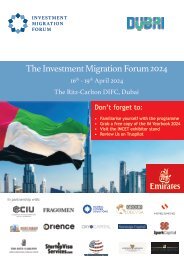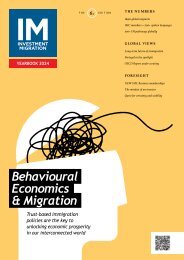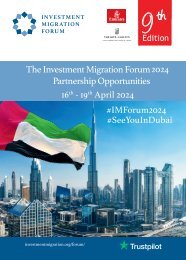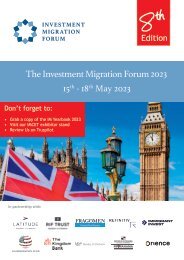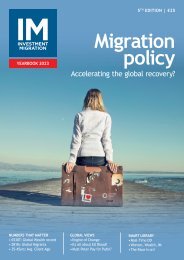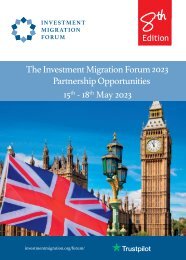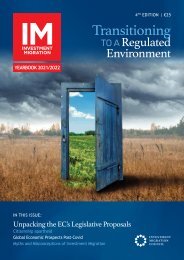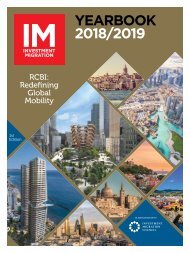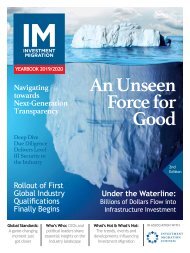IM Yearbook 2020/21
Born from the need for a global, credible, “go-to” publication, the 3rd IM Yearbook offers valuable access to a prime target audience of top industry influencers, decision makers, and the foremost referral network to the world’s most influential Investment Migration programmes: Government officials such as Heads of CIU’s, policy makers, academics, migration agents, law firms, wealth managers, financial advisors, real estate developers, and international firms involved in investment migration.
Born from the need for a global, credible, “go-to” publication, the 3rd IM Yearbook offers valuable access to a prime target audience of top industry influencers, decision makers, and the foremost referral network to the world’s most influential Investment Migration programmes: Government officials such as Heads of CIU’s, policy makers, academics, migration agents, law firms, wealth managers, financial advisors, real estate developers, and international firms involved in investment migration.
Create successful ePaper yourself
Turn your PDF publications into a flip-book with our unique Google optimized e-Paper software.
A Changing Market<br />
China has long been the dominant<br />
market for the entire industry, accounting<br />
for roughly 80% of applications to any<br />
residence programme. In more recent<br />
years, the industry has seen an increase in<br />
business coming from new markets such<br />
as India, Vietnam, Russia, South Africa<br />
and Nigeria. In addition, a meaningful<br />
shift is underway as applicants from firstworld<br />
countries such as US and the UK are<br />
showing interest in investment migration,<br />
a remarkable development for an industry<br />
that has traditionally zoomed in on highnet-worth<br />
individuals from emerging<br />
market economies. Surveys show that 17%<br />
more British citizens per year have moved<br />
to an EU country since the UK voted to<br />
leave the EU. Meanwhile, <strong>2020</strong> also got<br />
Americans consider moving out of the<br />
US in ever greater numbers – many say<br />
the unthinkable became thinkable due to<br />
rising social instability and the country’s<br />
poor coronavirus response. As a result of<br />
travel restrictions, the US passport – once<br />
one of the world’s strongest – has fallen<br />
to the same level as some of the world’s<br />
weakest. Southeast Asia is also developing<br />
rapidly, both as a source market and as a<br />
destination for high-net-worth individuals<br />
from the region and beyond. Programmes<br />
in Thailand, Malaysia and Singapore<br />
are today attracting global interest.<br />
The formation of a new international<br />
mobility landscape is creating large<br />
opportunities, particularly for companies<br />
who understand how the dynamics of<br />
global growth are shifting as the largest<br />
emerging markets gain in importance.<br />
In addition, regionalisation is a market<br />
force the industry needs to be aware<br />
of. An example of this trend is the<br />
rise of citizenship-by-investment<br />
programmes in the Middle East. The<br />
programmes of Turkey and Jordan<br />
mostly appeal to residents from the<br />
region who are not charmed by visa-free<br />
travel but by country-specific benefits<br />
and commercial opportunities.<br />
Full Transparency<br />
In tandem with the growth of both the<br />
demand and supply side, criticism of<br />
the industry is intensifying. Fears of a<br />
potential increase in security threats<br />
and low consumer protection standards<br />
reverberate across the entire sector.<br />
Questions on transparency and adherence<br />
to international standards on anti-money<br />
laundering and compliance regulations<br />
brought the sector into sharp focus<br />
of other countries and international<br />
organisations such as the EU, the <strong>IM</strong>F<br />
and the OECD who have demanded<br />
tighter controls across the industry and<br />
tighter background checks on applicants.<br />
Initiatives of the Investment Migration<br />
Council, such as the development of<br />
common due diligence standards and an<br />
anti-bribery code, show that the industry<br />
is recognising the need to either selfregulate<br />
effectively or accept that rules<br />
will be imposed on it. Recent scandals<br />
and media reports, including Al Jazeera’s<br />
investigations into the Cyprus programme,<br />
are taken very seriously as they highlight<br />
corruption as an area of vulnerability,<br />
albeit this is not peculiar to investment<br />
migration. A few bad actors can tarnish<br />
the reputation of the whole industry. In<br />
the presence of so much pressure, the<br />
industry can only survive if every party<br />
involved acts in a transparent manner.<br />
It’s unfortunate that the sector still<br />
remains largely unregulated, with only a<br />
handful of countries having established<br />
an independent regulator to oversee<br />
the operation of their programmes. The<br />
immediate challenge for the industry<br />
is to get all industry stakeholders to<br />
commit to the highest standards of<br />
transparency and good governance.<br />
Active versus Passive<br />
A major task for programmes going<br />
forward will be to find the right balance<br />
between the needs of the country and<br />
meeting the expectations of the applicants.<br />
Up to now property investments of one<br />
kind or another have featured prominently<br />
in all programme offerings. Property<br />
investment will always hold an appeal,<br />
but it will be on a more equal footing<br />
with other asset classes and investment<br />
options. There are already alternatives<br />
in the market that are resonating with<br />
wealthy clients, including investing<br />
in a property fund as opposed to<br />
purchasing property, and loan provision<br />
as opposed to equity investment.<br />
There is also consensus in the industry<br />
that in the future active investment will<br />
play a much greater role than passive<br />
investment as evidenced by the growing<br />
number of entrepreneurial schemes which<br />
are becoming ever more popular the world<br />
over. The average age of multi-millionaires<br />
in the world has decreased over the last<br />
two decades. Service providers report<br />
that in emerging market economies the<br />
average age of applicants is between 35 and<br />
45 years old, and many of them are young<br />
entrepreneurs spurring demand for active<br />
investment options as opposed to passive<br />
alternatives. All the major destination<br />
countries now offer entrepreneur visa<br />
programmes, and the expectation is<br />
that they will continue to experience<br />
strong demand. Unlike traditional RCBI<br />
programmes, they also often enjoy popular<br />
support as countries seem to favour<br />
immigrants who are actively engaged<br />
in their workforce as opposed to those<br />
who passively invest. Adopting elements<br />
of these successful business and talent<br />
migration programmes offers countries<br />
various opportunities to build a lasting,<br />
meaningful and substantive relationship<br />
with their new residents or citizens.<br />
Global Issues<br />
Many argue that the most remarkable<br />
side-effect of the Covid-19 pandemic has<br />
been the pause. After years of exponential<br />
growth, it gave the investment migration<br />
industry a moment to breathe and<br />
evaluate how it wants to evolve in the<br />
future. In practice, emerging stronger from<br />
the current situation requires forwardthinking<br />
players who are taking steps to<br />
own the solution, and over the past year<br />
or so, sections of the industry have begun<br />
developing new concepts. There is a<br />
clear will to ensure that the sector works<br />
for the greater good of all stakeholders.<br />
Thus far, investment migration is often<br />
overlooked as a factor within a country’s<br />
overall sustainability and development<br />
strategy. Aiming to lay a new foundation,<br />
researchers are urging countries to align<br />
their investment migration programmes<br />
more closely to the United Nations’<br />
2030 Sustainable Development Goals<br />
(SDGs), highlighting that investment<br />
migration can offer opportunities within<br />
each aspect of the SDGs, most notably in<br />
areas such as job creation, climate action<br />
and health infrastructure. Meanwhile,<br />
experts in the field of impact investment<br />
are seeking to establish a new asset class<br />
for investor migrants that aims to tackle<br />
global issues such as climate change<br />
and poverty reduction. Although it is<br />
still early days for these initiatives, many<br />
believe there is enormous potential in<br />
questioning and challenging investor<br />
preferences, as well as certain aspects<br />
of the industry’s business model, so that<br />
investment migration will unlock greater<br />
economic benefit and societal value.<br />
Future Outlook<br />
Investment migration has gone through<br />
enormous change since it started in the<br />
1980s. It is today more diverse than ever<br />
as illustrated by the growing number<br />
of entrepreneur, start-up, innovator<br />
and digital nomad visas available in the<br />
marketplace that are competing with<br />
the more traditional RCBI offering.<br />
Like in every sector, business models<br />
need to evolve over time. There is rising<br />
awareness that the industry can reinvent<br />
its business as one that is more socially<br />
and economically attuned to today’s<br />
societies. The Covid-19 pandemic, in<br />
fact, offers the industry the ultimate<br />
test scenario to find out what – beyond<br />
visa-free travel and financial capital –<br />
truly matters to investor migrants and<br />
programme countries. Confronting and<br />
responding to these dynamics should<br />
provide a path to new growth.<br />
12<br />
Investment Migration <strong>Yearbook</strong> 2O2O/2O<strong>21</strong>




